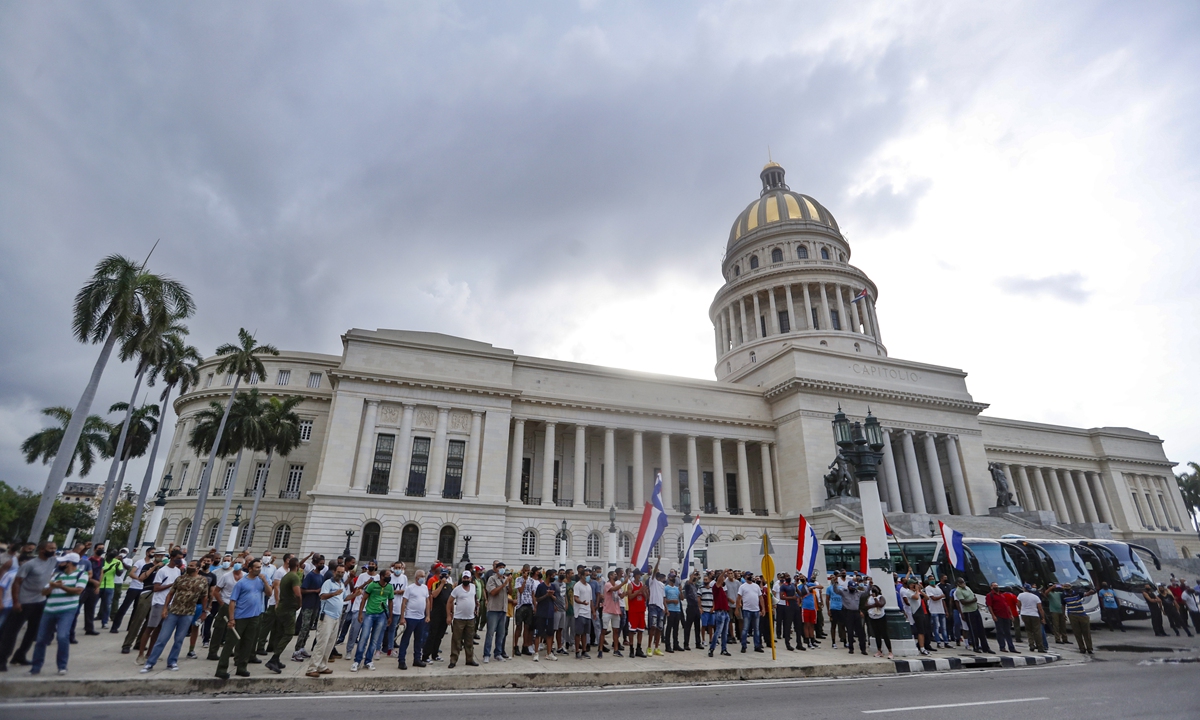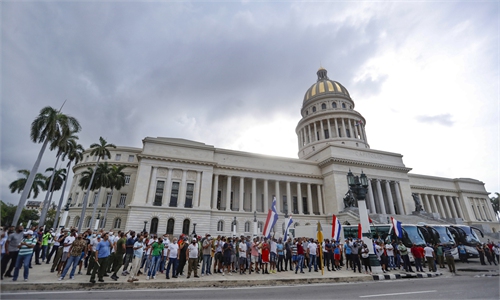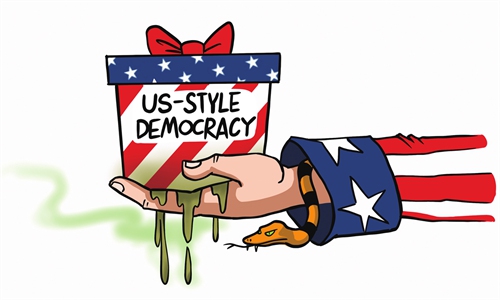
Cubans hold their country's flag to support Cuban President Miguel Díaz-Canel in front of the National Capitol building in Havana on Monday amid anti-government protests that were believed to be a US-backed "color revolution" attempt. Photo: VCG
Over the past weekend, Cuba reportedly saw the largest anti-government demonstrations in decades. Many US politicians have expressed their support for the protests in Cuba. US President Joe Biden said on Monday, "The US stands firmly with the people of Cuba." Cuban-American senators like Marco Rubio have been particularly vicious in slandering the Cuban government. The big picture the outside world has seen is: When protests take place in Cuba, the US seems to have launched a larger-scale campaign as a response.The demonstrations in Cuba were triggered by the current severe economic hardships, including a shortage of food and medicine, and frequent power outages. Furthermore, Cuba's COVID-19 epidemic prevention and control situation has taken a drastic turn for the worse. Cuba on Sunday reported the highest daily numbers of COVID-19 infections and deaths, with 6,923 new cases and 47 more deaths.
But no one believes it is natural that the discontent over the people's livelihood can be immediately led into the track of political protests. Cuban President Miguel Diaz-Canel said on Sunday that the protests were a form of "systemic provocation" by dissidents doing the bidding of Washington. In a Monday speech, Diaz-Canel blamed the unrest on US "politics of economic asphyxiation."
Cuba is an island country with a population of only over 11 million. The country lies very close to the US. But the US has imposed on Cuba the longest and severest sanctions in the recent history of international relations. In addition, the US has made the greatest efforts to carry out political infiltration activities in Cuba. Socialist Cuba's long existence under US sanctions and political infiltration and its survival after the disintegration of the Soviet Union are not the result of "domestic political repression."
Thomas Jefferson, a US founding father, expressed his idea of annexing Cuba. After the failed attempts, the US had gradually established its so-called Ripe Fruit foreign policy in relation to Cuba. It means the island country was like a fruit that would fall into the hands of the US as soon as it became ripe. In the pre-revolutionary era, Cuba was the equivalent of a semi-colony of the US, and its economy was controlled by US capitalists. After the revolution, the US invaded Cuba at the Bay of Pigs in 1961 and attempted over 600 times to assassinate former Cuban leader Fidel Castro.
It has been the US' long-term policy to overthrow the Cuban government. During the Obama administration, tensions between the two countries were eased for a while. But the relief was dismantled by the Trump administration.
It must be said that there is clearly something wrong with Cuba's epidemic prevention and its economy. But Cuba is striving to address its own problems. The US is creating the biggest resistance to prevent Cuba's attempts, trying to empower the destructive protest movements in Cuba. Washington's goal is to create a "color revolution" in Cuba, overturning Cuba's current administration, which goes against the norms of international relations. This is another embodiment of the US-style hegemony.
The goal of the US' Latin America policy is to operate the region as its backyard, make all regional countries serve its interests and overthrow thorns like the current Cuban government. Cuba's political system, which has long served as a model for the Latin American left, has fed into Washington's resentment of the Cuban administration. Yet the US policy toward Cuba has received little support in the international community. The United Nations in June passed another resolution calling for the US to end its Cuba embargo.
Cuba in recent years has embarked on reform and opening-up and has made various efforts to speed up development and improve people's livelihood. It is totally immoral for the US to continue to maintain the sanctions and to impose a high-intensity blockade on Cuba. It is especially criminal to maintain the embargo against the backdrop of the current serious escalation of the epidemic situation in Cuba.
We believe sanctions cannot force Cuba to discard its socialist system. Global forces of justice must support Cuba's efforts to maintain social stability and overcome current difficulties, and jointly condemn the US' practices of repression, infiltration and subversion against Cuba. We hope that Cuba will get rid of its crisis as soon as possible and take concrete actions with the help from the international community to break the US conspiracy again.


